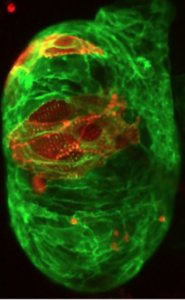Research
 Our goal is to increase our understanding of cardiovascular disease and thus break the cycle whereby individuals and families are impacted by death and suffering from heart and vascular disease. Through clinical trials, investigators and staff provide the mechanism for the collection of data to determine the efficacy and safety of new pharmaceuticals and devices. Trial recruitment and management is critical to the success of the program, and relies heavily on the independent work of study coordinators.
Our goal is to increase our understanding of cardiovascular disease and thus break the cycle whereby individuals and families are impacted by death and suffering from heart and vascular disease. Through clinical trials, investigators and staff provide the mechanism for the collection of data to determine the efficacy and safety of new pharmaceuticals and devices. Trial recruitment and management is critical to the success of the program, and relies heavily on the independent work of study coordinators.
Basic Science Investigation
The UNC McAllister Heart Institute is home to many talented investigators who study various aspects of cardiovascular disease. The Institute provides a unique opportunity for basic scientists to interact with clinicians. These interactions often result in innovative research projects that provide benefits to patients now and in the future. The institute’s goals include translating research discoveries into clinical practice, training the next generation of cardiovascular scientists, and educating local communities about advances and emerging issues in cardiovascular research. With over 40 laboratories, research interests span across the field.

Clinical Data Science
Clinical data science uses national and local databases to improve treatments, quality, outcomes and value for patients with cardiovascular disease. The ongoing development of clinical databases provides avenues for clinical research and enables cardiovascular fellows to develop the skills and a portfolio necessary to be independent cardiovascular disease researchers.
Several UNC faculty are involved in clinical data science including Rick Stouffer, Matt Cavender, Joe Rossi, Patty Chang, Lindsey Rosman, Faisal Syed, Anil Gehi, Larry Klein, John Vavalle, Kevin Friede, Mirnela Byku and Lisa Rose-Jones. The shared goal of these faculty members is to better leverage observational datasets to evaluate outcomes and patterns of care, perform quality improvement, track the quality of cardiovascular care, and provide the infrastructure for population health management. This group uses national databases (e.g. NIS, SPARCS), existing quality improvement registries (e.g. NCDR and GWTG) and novel databases developed using the EPIC EHR to collect data from all the hospitals in the UNC health system. Local collaborators include the Gillings School of Public Health, the Eshelman School of Pharmacy, the North Carolina Translational and Clinical Sciences Institute, the Carolina Data Warehouse.
An example of current projects includes:
- Cath PCI bleeding events resulting in DAPT cessation
- Cath PCI CHSA frailty score as a predictor of readmission
- Submassive pulmonary embolism outcomes research
- Clopidogrel Pharmacogenomics
- Impact of COVID-19 on arrhythmia and heart failure diagnostics from UNC device data
- Impact of COVID-19 on arrhythmia and heart failure diagnostics from UNC device data
- PCI DES outcomes by stent brand
- SCAI cardiogenic shock definition as predictor of in-hospital and post-discharge outcomes
- STEMI hemodynamics
- Utilization of Machine Learning Techniques to Identify Clinical and Genetic Determinants of Calcific Aortic Valve Disease
- Epidemiology and Cardiovascular Outcomes in Diabetic Cardiomyopathy

Clinical Trials
Our nationally and internationally recognized researchers have interests that span the full spectrum of cardiovascular diseases. There are two distinct groups managing clinical trials within the Division of Cardiology – the heart failure group and the cardiology clinical trials group. In addition, several faculty members work on investigator initiated research, employing clinical and administrative staff, interns, and work study students to assist. Provided below is a listing of the current clinical trials run through the cardiology clinical trials and heart failure groups.
MINT – The purpose of this study is to compare two red blood cell transfusion strategies (liberal and restrictive) for patients who have had an acute myocardial infarction and are anemic
EVOLVE-MI – The primary objective of this study is to evaluate the effectiveness of early treatment with evolocumab plus routine lipid management vs routine lipid management alone when administered in the acute setting to reduce myocardial infarction, ischemic stroke, arterial revascularization, and all-cause death in subjects hospitalized for an acute myocardial infarction (non-ST-segment elevation myocardial infarction [NSTEMI] and ST-segment elevation myocardial infarction [STEMI]).
REDEFINE – The overall purpose of this study is to investigate the long-term cardiovascular safety of CagriSema as fixed dose combination of cagrilintide and semaglutide in participants with obesity and established CVD
ZEUS – This study is conducted to see if ziltivekimab reduces the risk of having cardiovascular events (for example heart attack and stroke) in people with cardiovascular disease, chronic kidney disease and inflammation.
ECLIPSE – A trial to evaluate Orbital Atherectomy compared to conventional balloon angioplasty technique for the treatment of severely calcified lesions prior to implantation of drug-eluting stents (DES)
PEERLESS – A trial of the FlowTriever System compared to Catheter-Directed Thrombolysis (CDT) for use in the treatment of acute pulmonary embolism. The trial includes a non-randomized cohort of subjects with an absolute contraindication to thrombolysis.
RADIANCE CAP – This is a non-randomized study designed to allow for continued access to ultrasound renal denervation therapy via the Paradise System, and to allow for the on-going collection of safety and effectiveness data in subjects with uncontrolled hypertension despite the prescription of antihypertensive medications.
OCEANIC-AF – This is a study to compare the efficacy and safety of the oral FXIa inhibitor asundexian (BAY 2433334) with apixaban for the prevention of stroke or systemic embolism in male and female participants aged 18 years and older with atrial fibrillation at risk for stroke
ACURATE IDE – A multi-center, randomized trial to evaluate safety and effectiveness of the ACURATE Transfemoral Aortic Valve System for transcatheter aortic valve replacement (TAVR) in subjects with severe native aortic stenosis who are indicated for TAVR
CLASP-II – This is a study intended to establish the safety and effectiveness of the Edwards PASCAL Transcatheter Repair System in patients with symptomatic severe tricuspid regurgitation who have been determined to be at an intermediate or greater estimated risk of mortality with tricuspid valve surgery by the cardiac surgeon with concurrence by the local Heart Team
TRISCEND II – The study is a prospective, multi-center, randomized controlled pivotal clinical trial to evaluate the safety and effectiveness of the EVOQUE System with optimal medical therapy (OMT) compared to OMT alone in the treatment of patients with at least severe tricuspid regurgitation.
ATRIUM – The primary aim is to test whether abatacept, as compared to placebo, is associated with a reduction in major adverse cardiac events (MACE) among participants hospitalized with myocarditis secondary to an immune checkpoint inhibitor (ICI).